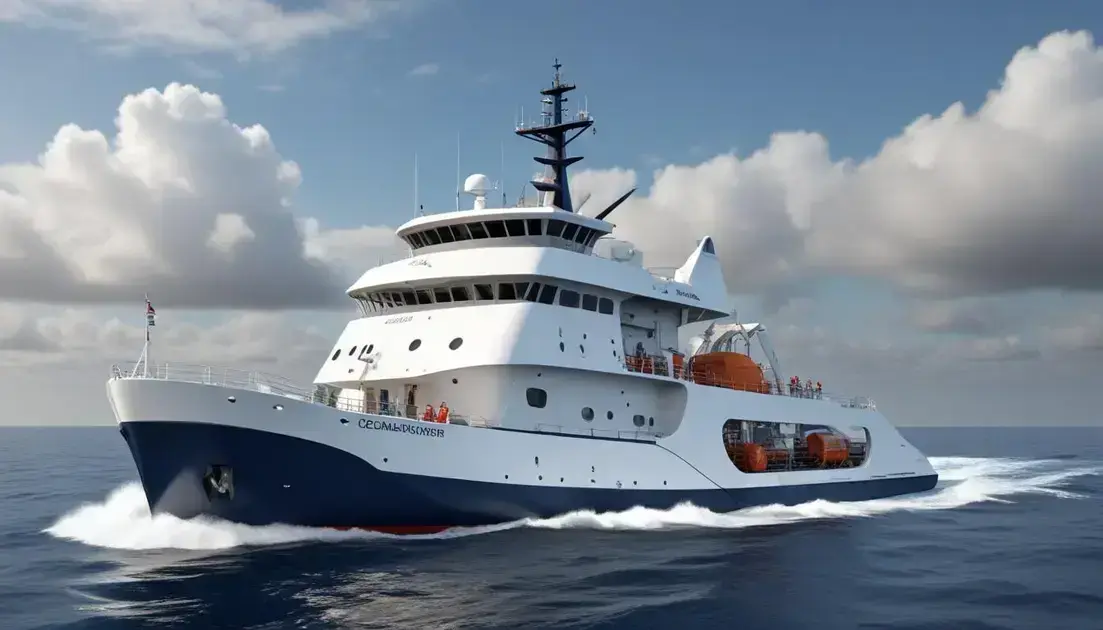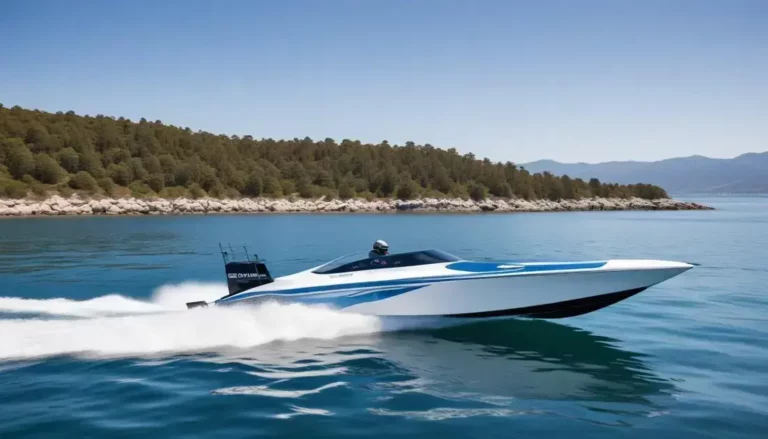OceanX and World Water Day: Exploring Marine Insights
Ocean conservation is essential for maintaining biodiversity, regulating climate, and ensuring sustainable resources, with organizations like OceanX leading impactful research and protection efforts through advanced technology and community engagement.
On this World Water Day, we dive into how ocean conservation is becoming more crucial than ever, especially with innovations from OceanX. Curious to see how technology plays a role? Let’s explore!
Introduction to OceanX and its mission
OceanX is a pioneering organization dedicated to ocean exploration and conservation. Their unique approach blends cutting-edge technology with a passion for discovering the mysteries of the deep sea. By utilizing advanced submersibles and research vessels, OceanX embarks on expeditions that not only map uncharted territories but also unravel the intricate ecosystems that thrive beneath the waves.
The mission of OceanX extends beyond exploration; it aims to inspire a global audience to understand and protect marine life. Through engaging documentaries and educational programs, they highlight the importance of the oceans in regulating our planet’s climate and supporting biodiversity. Their work emphasizes that every individual can contribute to the protection of our seas.
Collaboration is at the heart of OceanX’s initiatives. They partner with scientists, conservationists, and organizations worldwide to amplify their impact. These partnerships allow for the sharing of knowledge and resources, enhancing the effectiveness of their conservation efforts. With each expedition, OceanX seeks not only to discover but also to advocate for sustainable practices that ensure the future of our oceans.
Significance of World Water Day
World Water Day is an annual event that emphasizes the crucial importance of water in our lives and the sustainability of our planet. Celebrated on March 22, it serves as a reminder of the ongoing challenges related to water access and quality. This day brings attention to how essential water is for health, food security, and overall economic development.
The significance of World Water Day lies in its ability to rally governments, organizations, and individuals around a common cause. By highlighting water-related issues, this event encourages action and fosters collaboration across sectors. Each year, a specific theme is chosen, focusing on pressing issues such as water conservation, pollution, or the impact of climate change on water resources.
Moreover, World Water Day is an opportunity to educate communities about the importance of sustainable water management. With growing populations and increasing pollution, effective strategies are necessary to ensure availability for future generations. Awareness campaigns and local initiatives often stem from this day, helping to instill a sense of responsibility in everyone regarding their water use and its effects on the environment.
Technological advancements in ocean exploration
Recent technological advancements have revolutionized ocean exploration, enabling scientists to access and study areas previously considered unreachable. Innovations such as autonomous underwater vehicles (AUVs) and remotely operated vehicles (ROVs) have opened new frontiers in marine research. These advanced tools allow for detailed mapping and data collection from the ocean floor to its surface.
One significant development is the use of sonar technology that provides high-resolution images of the underwater terrain. This technology helps researchers identify potential habitats for marine life and enhances the understanding of geological features. Coupled with advancements in satellite imaging, we can now monitor ocean changes on a global scale.
Moreover, the integration of artificial intelligence in data analysis accelerates the ability to process vast amounts of information collected during expeditions. Machine learning algorithms can sift through this data, identifying patterns and trends, which leads to more informed decisions in conservation efforts.
The collaboration between scientists, engineers, and technology developers is crucial in pushing the boundaries of what we can discover in our oceans. These advancements not only facilitate scientific inquiry but also foster awareness about the importance of marine conservation.
Impact of climate change on marine ecosystems
The impact of climate change on marine ecosystems is profound and far-reaching. As global temperatures rise, ocean waters are becoming warmer, leading to shifts in marine biodiversity. Many species are forced to migrate to cooler areas, disrupting established ecosystems. This displacement can result in less biodiversity and the decline of vulnerable species.
Additionally, the increasing levels of carbon dioxide in the atmosphere contribute to ocean acidification. As oceans absorb more CO2, the water becomes more acidic, affecting calcifying organisms such as corals and shellfish. These species are critical to marine food webs, and their decline poses risks to entire ecosystems and the communities that rely on them.
Moreover, climate change exacerbates the frequency and intensity of extreme weather events, such as hurricanes and droughts. These events lead to habitat destruction and increased runoff, causing pollution and nutrient loading in marine environments. As a result, harmful algal blooms can proliferate, creating dead zones devoid of life.
To mitigate these impacts, global efforts must focus on sustainable practices and strategies that protect marine habitats. Understanding the intricate relationships within marine ecosystems is essential for developing effective conservation policies and ensuring the resilience of our oceans against the challenges posed by climate change.
Proudest achievements in ocean conservation
Ocean conservation has seen remarkable advancements in recent years, showcasing some of the most impactful achievements in environmental protection. One of the most significant victories is the establishment of marine protected areas (MPAs). These designated zones help safeguard critical habitats, allowing ecosystems to recover and thrive without the pressures of overfishing and pollution.
Another proud accomplishment is the revival of endangered species through concerted conservation efforts. Initiatives aimed at protecting species like the humpback whale and sea turtles have led to population rebounds, proving the effectiveness of comprehensive strategies that include habitat preservation and reducing human interference.
Technological innovation plays a crucial role in these successes. Tools such as satellite monitoring and underwater drones help researchers track marine health and enforce regulations. These technologies enable scientists to gather essential data, ensuring informed decision-making for the future of conservation.
Furthermore, public awareness campaigns have significantly increased community engagement in ocean conservation efforts. Educational programs, often supported by organizations like OceanX, empower individuals to take action, fostering a culture of sustainability. Collectively, these achievements not only protect marine ecosystems but also inspire ongoing efforts to advocate for a healthier planet.
Looking ahead: Future plans for OceanX
Looking ahead, OceanX has set ambitious plans to further enhance its impact on ocean exploration and conservation. One of the primary objectives is to expand the network of marine protected areas globally. By collaborating with governments and organizations, OceanX aims to safeguard critical habitats that support diverse marine species and ecosystems.
Additionally, OceanX plans to enhance its technological capabilities by integrating more advanced research tools. This includes the development of state-of-the-art underwater drones and improved data collection systems that can monitor ocean health in real time. These innovations are vital for tracking the effects of climate change and human activity on marine environments.
Education and outreach will also play a crucial role in the future of OceanX. They intend to launch new initiatives that engage communities and promote awareness about ocean conservation. By creating immersive educational experiences, OceanX seeks to inspire the next generation of marine scientists and advocates.
Furthermore, partnerships with leading researchers and conservationists will be strengthened to drive impactful studies and initiatives. OceanX’s focus on collaboration and innovation is essential for tackling the pressing challenges facing our oceans and ensuring a sustainable future for marine life.
In conclusion, the importance of ocean conservation
Oceans are vital to our planet, providing resources and supporting diverse ecosystems. As we have explored, organizations like OceanX play a crucial role in uncovering the mysteries of our seas and advocating for their protection.
Through innovative technology, successful conservation efforts, and community engagement, we can tackle the pressing challenges facing our oceans today. These efforts not only benefit marine life but also enhance human understanding of environmental health.
Working together, we can ensure our oceans thrive for generations to come. It’s essential to support sustainable practices and be aware of how our actions impact marine environments.
By taking steps to protect our oceans, we contribute to a healthier planet, enhancing both biodiversity and our own well-being. Let us continue to advocate for ocean conservation and inspire others to join this critical mission.
Frequently Asked Questions
Why is ocean conservation important?
Ocean conservation is vital because oceans regulate our climate, provide resources, and support diverse ecosystems. Protecting them ensures the health of the planet.
What role does OceanX play in ocean conservation?
OceanX engages in exploration and education, using advanced technology to study marine ecosystems and advocate for their protection.
How can technology aid in marine research?
Technology, such as underwater drones and satellite monitoring, allows researchers to gather data, track ocean health, and enforce conservation efforts more effectively.
What are marine protected areas (MPAs)?
Marine protected areas are designated regions in oceans where human activities are limited to protect the habitats and species that live there.
How does climate change affect marine life?
Climate change impacts marine life by warming ocean temperatures, causing acidification, and altering habitats, which can lead to species decline and biodiversity loss.
What can individuals do to support ocean conservation?
Individuals can support ocean conservation by reducing plastic use, conserving water, participating in beach cleanups, and advocating for policies that protect marine environments.






